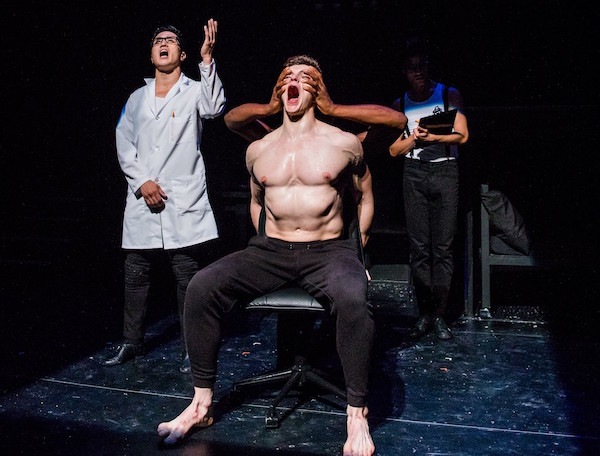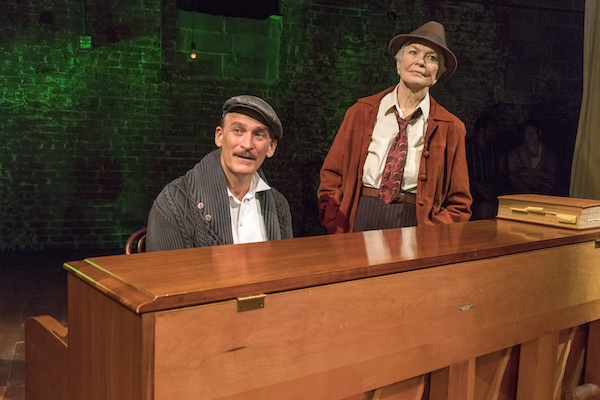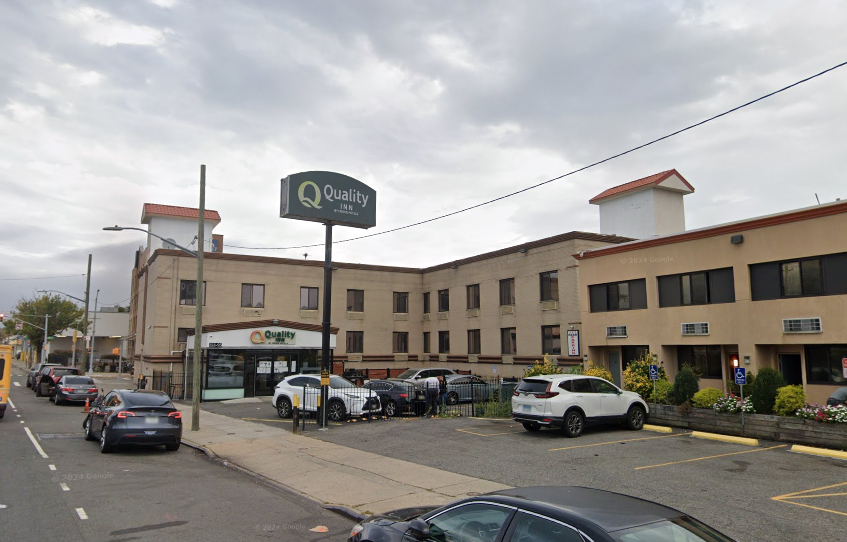
BY CHRISTOPHER BYRNE | Amy Herzog’s magnificent new play “Mary Jane” is powerful, deeply moving, and breathtakingly economical. The story of a single mother taking care of her desperately ill child sneaks up on you, as the mother, Mary Jane, tries to manage the health care system and her ongoing losses while struggling to put a game face on in navigating an ongoing tragedy. The tale is so compelling because it is so honest and simple, and in the larger sense it underscores how many people in our country suffer invisibly with health issues that overwhelm them. Seen against the backdrop of the tone-deaf and cynical efforts to rip insurance away from those who need it by repealing the Affordable Care Act, the play becomes as provocative as it is chilling.
Director Anne Kauffman does a remarkable job building suspense and compassion for all the characters, not just Mary Jane and her son, who is barely seen. As Mary Jane, Carrie Coon delivers an unforgettable performance. She embodies, with absolute precision, the dichotomy between chaos and control that her character experiences. She keeps the audience hanging on every moment.
The other members of the cast are equally focused. Liza Colón-Zayas as the doctor and as Sherry, a home aide, Danaya Esperanza as Sherry’s daughter and as a music therapist, and Brenda Wehle as Mary Jane’s landlord and as a hospital chaplain are all excellent. Susan Pourfar as a friend of Mary Jane’s and, later, as Chaya, another mother with an ill child in the hospital, is especially moving. Pourfar is an actress who is always exciting to see, specific in her performances, imbuing each moment with honesty. If her scene with Coon as two mothers in the hospital doesn’t wring your heart, I’m afraid you may be missing something in your ticker.
One plays finds a path straight to the heart; two others lose their way
The surprising and ingenious set by Laura Jellinek and the sensitive lighting design by Japhy Weideman contribute significantly to the overall feeling of the production. This is contemporary theater at its best, speaking to us in an era of uncertainty and conflict while touching a humanity that is timeless.

There is much more concept than content in the new production of “A Clockwork Orange” now over at New World Stages. Anyone, like me, unfamiliar with either the 1962 novel by Anthony Burgess or Stanley Kubrick’s 1971 film is likely to be almost completely lost. Rather than clearly telling a story, director Alexandra Spencer-Jones has instead created a performance piece, part dance, part Cirque du Soleil, inspired by the source material. Obscurity, however, is not artistry, and tedium sets in soon after the lights come up. This is somewhat offset by the nine men with seemingly perfect bodies, prodigious athleticism, and homoerotic titillation who perform the piece, but even that is insufficient to maintain interest over the hour and 45-minute running time, sans intermission.
The program provides no clues as to who wrote this piece, and therein lies its problem. The tale flounders from set piece to set piece, and it’s only over time that one picks up that one Alex DeLarge is an lower-class English boy who, with his friends, goes on a spree of violence. He speaks in a slang language that is neither explained nor contextualized, so he and his mates might as well be speaking gibberish.
Alex is eventually caught after a violent attack and institutionalized, where he undergoes a radical treatment to cure him of his antisocial tendencies. The sequence in the institution is the only point where Spencer-Jones attempts anything like a discernible narrative, and so the piece, which is largely characterized by dramatic movement, stops dead in its tracks. The stylistic inconsistency is frustrating, to say the least.
When one is finally able to piece together some of the story, it seems that the tale is in the vein of the “angry young men” of post-World War II Britain. It has echoes of John Osborne and a level of absurdity that prefigures Joe Orton. However, Spencer-Jones has negated any cultural context or character development, which would have been a great deal more engaging. The whole evening feels like an exercise, more a self-conscious graduate school project than professional theater.
The company, though uniformly handsome with skilled physicality, unfortunately offers little in the way of acting. There is a lot of hollering. Jonno Davies as Alex, whom this production is “introducing,” is not well-served by the director who keep his performance presentational. One needs to have some level of empathy for Alex to give the piece any emotional impact, but it’s not there.
Perhaps if one knows the original material, this is a more compelling interpretation. Like ballet based on Shakespeare, the abstraction of the artform can enhance and illuminate the original. That’s not the case with “A Clockwork Orange,” and the result is a pulpy mess.

Speaking of Shakespeare, his plays enjoy remarkabe durability, usually no matter what people do to them. The timeless stories, beautiful language, and unforgettable characters have, over the centuries, survived any number of cuttings and concepts and gone on unscathed.
Such is the case with John Doyle’s new mounting of “As You Like It” at CSC. Cut down to a brisk 105 minutes and with songs by Stephen Schwartz, the play is the thing that will keep you entertained. The production, not so much. Schwartz’s songs are pastiche Rodgers and Hart ditties meant to convey the 1930s, one thinks, and they’re charming enough. The staging in a largely open space labors to make sure people on each of the three sides can see enough. The actors play instruments, which is a Doyle trademark but one that is starting to wear out its welcome.
The cutting takes away a lot of the lyricism of the play in favor of being expeditious, and that’s too bad. The entire opening is rocketed through, and the actors seem to be consciously working against what is actually left of the poetry. It makes the first third fairly dull. The goal seems to be to lay out the plot as fast as possible — banish Rosalind, daughter of the Duke usurped by his brother; chase out Orlando, the young man who has fallen for Rosalind, who in turn secretly loves him; and get everyone as quickly as possible to the forest of Arden so the fun can begin.
Fortunately, it does. Rosalind is now the boy Ganymede. She teaches Orlando how to be a lover. Rosalind falls in with her father’s cohort in the forest, including the melancholy Jacques, and mistaken identities and love ensue among the country folk, all tied up cutely in a quadruple wedding. There’s a dance, and it’s done.
The charm of this production rests mainly in the company. Hannah Cabell is excellent as Rosalind/ Ganymede. She plays the boy well, and her comic timing is spot on, as is that of Quincy Tyler Bernstine as Celia. André de Shields is fun as Touchstone, and Bob Stillman plays both Dukes (and the piano) very well. Ellen Burstyn as Jacques is on stage most of the play, and it seems as if she’s telling the story, but one can’t really be sure. She wanders around a lot. Jacques has the most famous speech in the play, usually known as “The Seven Ages of Man,” but it barely registers.
Still, at the end, under a group of multi-colored, acorn shaped lights, one can’t help but be charmed by the happy ending and the circuitous route it took to get there. In the end, the play just works, no matter what they did to it. That’s Shakespeare for you.
MARY JANE | New York Theatre Workshop, 79 E. Fourth St., btwn. Bowery & Second Ave. | Through Oct. 29 | Tue.-Wed. at 7 p.m.; Thu.-Sat. at 8 p.m.; Sat.-Sun. at 2 p.m. : $45-$65 at nytw.org or 212-460-5475 | One hr., 35 mins., no intermission
A CLOCKWORK ORANGE | New World Stages, 340 W. 50th St. | Mon., Wed.-Sat. at 8 p.m.; Sat. at 2 p.m.; Sun. at 3 & 7:30 p.m. | $69-$129 at telecharge.com or 212-239-6200 | One hr., 45 mins., no intermission
AS YOU LIKE IT | Classic Stage Company, 136 E. 16th St. | Through Oct. 22: Tue.-Thu. at 7 p.m.; Fri.-Sat. at 8 p.m.; Sat.-Sun. at 3 p.m. | $61-$126; ovationtix.com or 866-811-4111 | One hr., 45 mins., no intermission





























